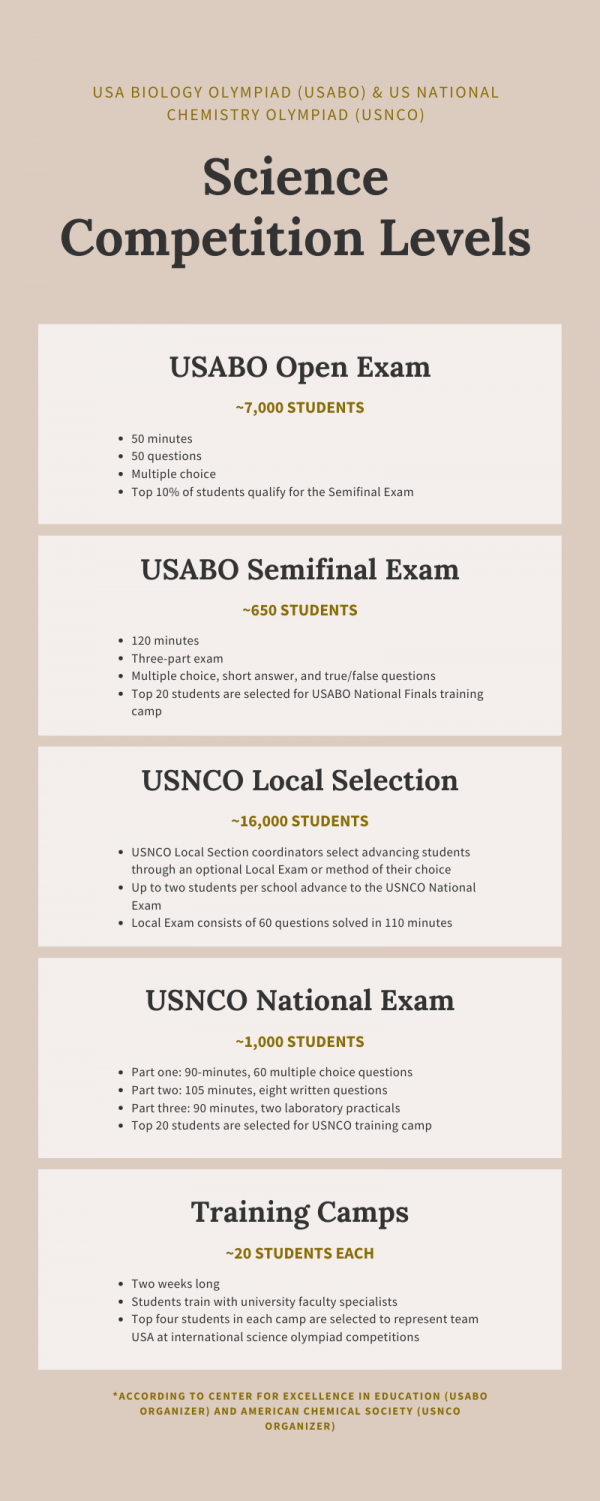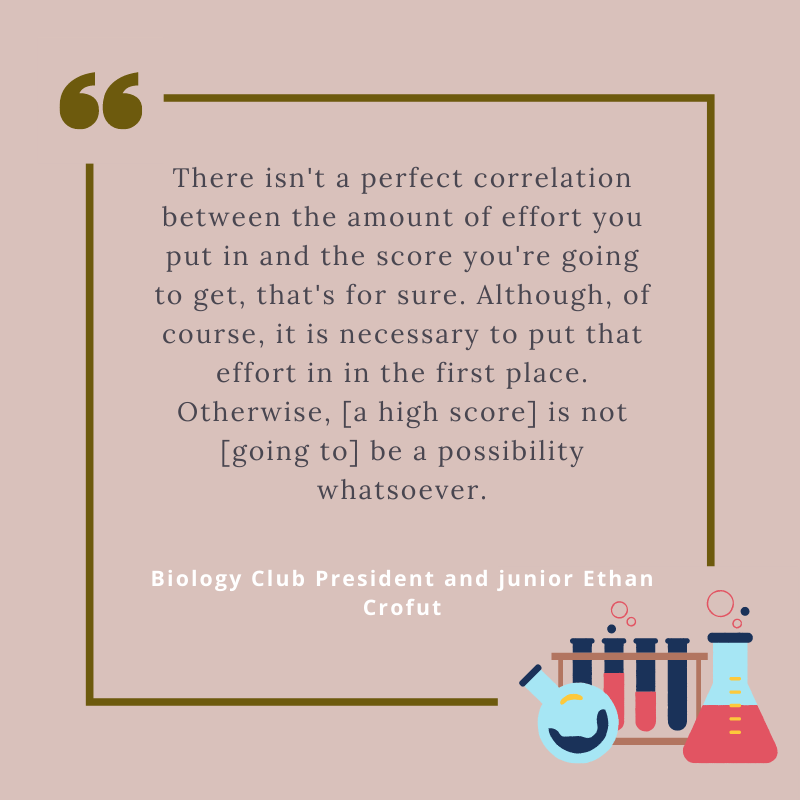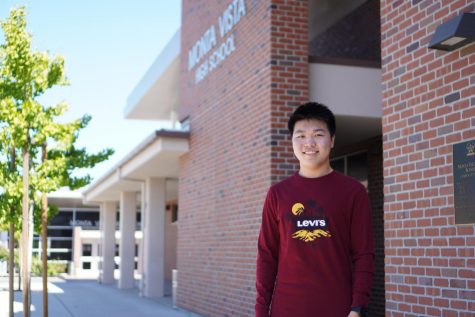Science
Students share about their preparation process and experiences taking part in science olympiads
March 25, 2021
As junior and Biology Club president Ethan Crofut scrolled through his digital 2021 USA Biology Olympiad (USABO) Open Exam, something felt off. A question asked him to identify labels of structures within a diagram, but he couldn’t find any diagram. He looked around the question and only found a backup link to an image. Looking through the rest of the problems, he realized that none of his test images had appeared.
During the 2020-21 school year, many science competitions such as the USABO have moved to an online format. USABO’s technical issue with undisplayed images impacted many participants, leading the Center for Excellence in Education (CEE), the USABO exam organizers, to search for a solution. At first, they allowed students varying amounts of extra time to redo their work on the exam, depending on the extent to which each participant was impacted, though Crofut explains that many perceived this as inequitable — some students received no time, while other students received double the time originally allotted. After controversy over this decision, CEE decided to instead allow all participants to advance to semifinalist status and take the USABO Semifinal Exam, regardless of their preliminary Open Exam score.
The USABO Open Exam is a 50-minute multiple choice biology exam. Usually, students who score within the top 10% of participants are invited to take the USABO Semifinal Exam, which is a 120-minute exam with a mix of multiple choice and free response questions. The top 20 participants of the semifinalist round will be selected as National Finalists and the top four students as determined by several additional exams will be selected to participate in the International Biology Olympiad.

According to Crofut, CEE’s decision to allow everyone to advance to the semifinalist round actually gave many participants less recognition for their accomplishments. Since around 1,500 participants usually take the exam, 150 students would typically qualify for the semifinalist round. However, after everyone advanced to the Semifinalist Exam this year, only the top 20 National Finalists will receive special recognition, while participants who might originally have distinguished themselves as semifinalists will not receive any recognition.
Another popular science competition is the U.S. National Chemistry Olympiad (USNCO). The competition starts with a local round, in which students are nominated by Local Section Coordinators, generally by taking a 110-minute, 60-question multiple choice exam. The top two students from MVHS compete to become part of a total of 15 top students from Silicon Valley, who will advance to the national competition with 1,000 other national contestants. The National Chemistry Olympiad Exam is broken up into three parts — multiple choice, free-response and lab practical problems. The top 20 students are selected to enter a summer study camp with rigorous training and additional exams, and the four strongest performers are selected to participate in the International Chemistry Olympiad.
Many students who score well on the USABO and USNCO exams invest months or years of time in advance of the competitions studying curriculum and test-taking strategies in order to maximize their chances of performing well. Senior and Chemistry Club co-president Eugene Yoon notes that for most science competitions, there are “holy textbooks” that cover a wide breadth of fundamental topics for a scientific subject. In biology, junior Kyle Zhao notes that Campbell Biology is a popular textbook covering most biology topics. For chemistry, Yoon shares that many students turn to Chemical Principles as a starting point for their preparation. Zhao, Yoon and Crofut found that the content covered in these olympiads far exceeds the depth of AP courses or exams in the same subjects.

“[Chemistry] requires a lot of planning, just like any other subject has a lot of concepts,” Yoon said. “And you can’t cram it in a couple of weeks. So I would say, give yourself at least a few months, and be very diligent in them. I did a lot of practice exams because obviously, the Chemistry Olympiad is going to be like the previous exams in other years.”
While good preparation can take students a long way toward success in these competitions, Crofut shares that olympiads are evolving to become more difficult. He notes that problems are not only becoming more niche, but in recent years, have also required more synthesis of different topics and logical reasoning. In particular, he cites that in the 2020 USABO Open Exam round, many questions explored topics outside of those covered in common study materials such as the Campbell Biology textbook. To Crofut, the test seemed to be designed against those who put in a lot of effort studying basic materials.
“There isn’t a perfect correlation between the amount of effort you put in and the score you’re going to get, that’s for sure,” Crofut said. “Although, of course, it is necessary to put that effort in in the first place. Otherwise, [a high score] is not [going to] be a possibility whatsoever.”
Preparing for the exams also had positive impacts on Zhao, Yoon and Crofut beyond just obtaining a better score for a contest. For Crofut, studying biology concepts helped him get a head start for the AP Biology exam and set him up to score a five, or full score, on the exam without too much hassle. Zhao found that he was able to apply logical reasoning skills in his math classes and was also able to take advantage of tidbits of knowledge.
“Practicing … definitely helped my mental math skills since I guess just doing a lot of math problems trains your brain to think fast,” Zhao said. “Sometimes [with] gardening related stuff, you kind of know [the difference between] acidic soil, basic soil and different nutrient deficiencies for plants.”
Beyond being able to apply subject knowledge in other parts of his studies, Yoon experienced a deeper impact from training for USNCO. Taking the challenging contest under time pressure shifted his test-taking mentality and helped him for other tests as well.
“I think the way I prepared for chemistry a little bit helped me become more relaxed when taking all exams,” Yoon said. “Before I took the Chemistry Olympiad, I used to have a huge fear complex when taking exams, but afterward, [even] taking standardized exams, it became much easier for me since I’ve had so much practice while studying and preparing for chemistry.”
















